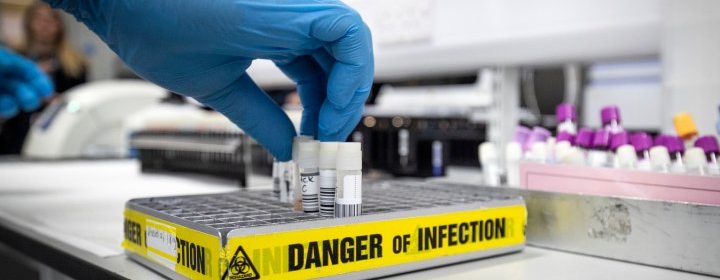The importance of Phase 3 trials for a coronavirus vaccine — and why it can’t be rushed

The race to find a coronavirus vaccine continues as pharmaceutical companies and governments around the world continue to conduct clinical trials — and many of them are reaching the critical Phase 3 step.
There are currently 34 vaccine candidates in various clinical trial phases, including one in Canada, according to the World Health Organization (WHO). And as some clinical trials come close to creating a vaccine for the public, the race has sparked safety concerns over hurrying an inoculation.
On Sept. 4, the WHO warned against rushing a vaccine, especially during the Phase 3 clinical trials.
“This Phase 3 must take longer because we need to see how truly protective the vaccine is and we also need to see how safe it is,” WHO spokeswoman Margaret Harris said during a media conference.
Here’s a look at the phases vaccine testing must go through, and why the third phase carries so much weight.
What are the different clinical trial phases?
For a COVID-19 vaccine to get approved, it should go through three phases of clinical trials. Each phase has a number of volunteers and objectives.
Phase 1 clinical trials are often the first time a new drug is tested on people. The drug is tested on a small group of volunteers (15 to 30 people) and the objective is to look at its safety, find out the dosage range and see if there are any side effects, according to Health Canada.
If that is approved, the drug moves onto Phase 2 clinical trials. In this phase, the drug is given to a larger group of people (usually 100 or more). The trials further test its safety as well as its best dose.
[ Sign up for our Health IQ newsletter for the latest coronavirus updates ]
If approved, the drug then heads into Phase 3 clinical trials. In this stage, it is given to an even larger group of people (ranging from 1,000 to 50,000) to make sure it is still effective, to monitor its side effects and to compare it to commonly used treatments, Health Canada’s website explains. Sometimes a placebo is used.
Why Phase 3 is so important
Because of Phase 3’s use of a large number of volunteers, the stage is incredibly important, according to Timothy Sly, an epidemiologist and professor emeritus at Ryerson University’s School of Public Health
“This is a big phase. It takes a lot of time, effort and money,” he said. “You cannot just rush it.”
Phase 3 can sometimes take years to complete, which Sly said is largely due to trying to find a sizeable number of volunteers. But during a pandemic, where millions of people are infected, it’s easier to find willing volunteers.
For example, British drugmaker AstraZeneca is conducting a Phase 3 trial for its vaccine candidate and is enrolling up to 50,000 participants from Brazil, South Africa and the United States.
Along with determining whether the vaccine protects people, Phase 3 can reveal uncommon side effects that may not have shown up in previous phases with a smaller number of volunteers, according to Daniel Salmon, the director of the Institute for Vaccine Safety at Johns Hopkins University.
“By looking at bigger populations, you can look for things (side effects) that are less common,” he said. “You can look for things that can happen in populations that are only among people who are older, maybe people who have certain medical conditions.”
Salmon explained that once all the data comes back, and the evidence shows its effectiveness and very safe, the vaccine can be approved for the general public.
The WHO previously said vaccines must be effective in at least 50 per cent of the population for any chance of approval, and closer to 70 per cent is better. Once a vaccine developer declares a vaccine is both safe and effective, nations can begin the work to approve its use on its citizens.
What coronavirus vaccines are currently in Phase 3?
So far there are nine vaccine candidates in Phase 3 clinical trials, according to the WHO:
- AztraZeneca/University of Oxford/Serum Institute of India (Britain)
- CanSino Biological and the Beijing Institute of Biotechnology (China)
- Moderna and the National Institute of Allergy and Infectious Diseases (U.S.)
- Janssen Pharmaceutical Companies/Johnson & Johnson (U.S.)
- BioNTech/Fosun Pharma/Pfizer (U.S. and Europe)
- Sinovac (China)
- Beijing Institute of Biological Products and Sinopharm (China)
- Wuhan Institute of Biological Products and Sinopharm (China)
- Gamaleya Research Institute (Russia)
Skipping Phase 3?
Russia has approved vaccines without waiting for the results of Phase 3 trials.
On Aug. 11, Russia announced it had approved a coronavirus vaccine called vaccine Sputnik V. The vaccine has not yet passed the advanced trials, such as Phase 3, normally required to prove it works before being licensed.
According to records kept by the WHO, the vaccine has only registered Stage 1 trials.
While Russian President Vladimir Putin said the vaccine is “efficient” and forms a “stable immunity,” scientists around expressed concerns about the lack of published data on how safe it is and how well it works.
“This has to be driven by science and evidence,” Salmon said. “If we want this to be a product that is safe and effective, it has to be driven the science. And equally importantly, if we want people to want a vaccine, we’ve got to trust the process. And if people think it’s coming from political pressures, they are not going to trust the process.”
— With files from Global News’ Leslie Young and The Associated Press
Source: Read Full Article